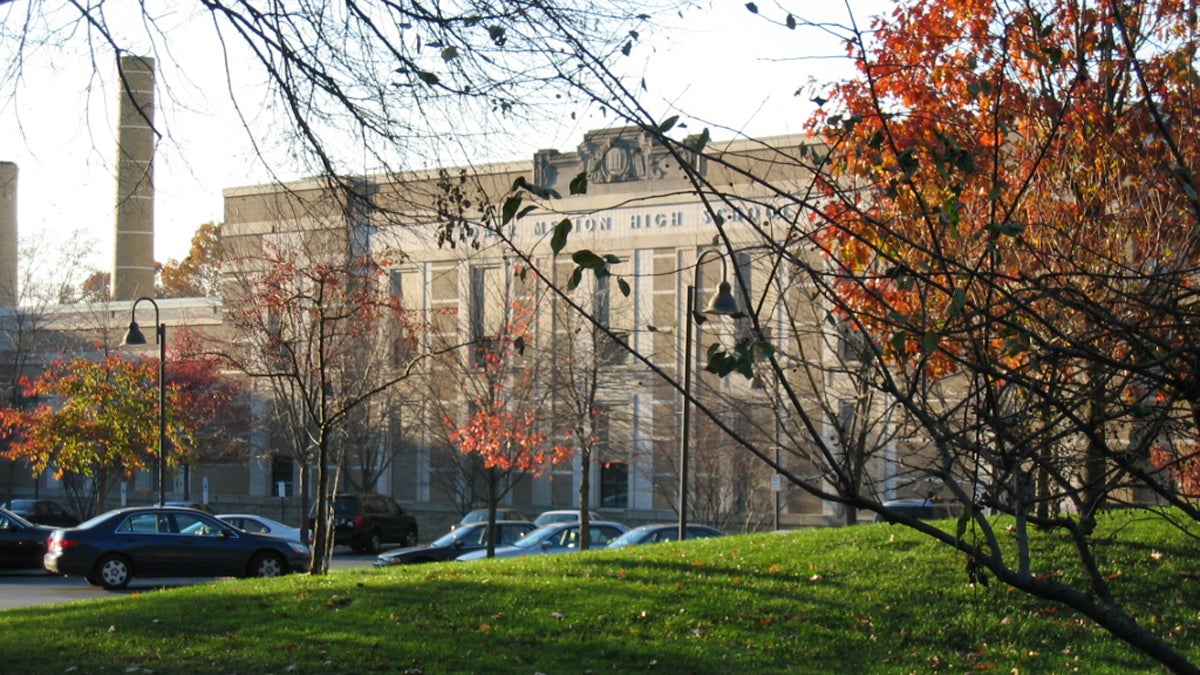Main Line district sits for PSSAs with 20x increase in opt-outs

File photo: Lower Merion High School (Image via Benofmerion/Wikimedia Commons)
Parents in some suburban Philadelphia school districts are opting out of standardized tests in previously unseen numbers. One test, the Pennsylvania System of School Assessments (PSSA) started Monday.
“The number of parents who are requesting to see the exam has gone up 1000, 2000 percent, compared to previous years,” said In Lower Merion School District acting superintendent Wagner Marseille. The district requires parents to view the tests before signing a document requesting to opt out their kids.
Just how many kids? Marseille said an exact number is not available, but is “close to 200,” up from about a dozen last year. And he expects that number to rise.
“We’ve had incidents of parents showing interest in not having their kids take the test the morning of the exam,” said Marseille. Last year, about 1,000 students across Pennsylvania sat out the PSSAs.
The parents’ reasons — loss of instruction time, stress on students — echo some concerns of the nation-wide opt-out movement, according to Marseille.
But the reality of testing in an affluent district with high-performing schools is different than in urban districts, where tests raise the specter of school closings.
“We wanted moms to get angry.”
Margene Biederman from Lower Merion is opting her two children, one fourth grader and one eighth grader, out of the PSSAs.
A couple of years ago, Biederman said she learned art and music instruction were getting cut back in her children’s elementary schools. So she said, “I got involved with a group of parents that were concerned about the connection between . . . using more of the school day to prepare for standardized test and cutting back on areas of education that addressed children’s physical and emotional developmental needs.”
To raise awareness, some of the parents screened “Standardized: Lies, Money & Civil Rights – How Testing Is Ruining Public Education,” a movie by a Berks County English teacher Daniel Hornberger, at a church in Bryn Mawr earlier this year.
In an interview with The Patriot-News, Hornberger shared the reason for making the film: “The target audience for this is moms. We wanted moms to get angry.”
Moms like Biederman, who attended the Bryn Mawr screening, responded. “I viewed the test at my daughter’s elementary school and tomorrow I’m sending a letter” to opt her out, Biederman said on Thursday.
As the numbers show, Biederman’s is not an isolated case. Parents from the Treddyffrin/Easttown School District plan to show “Standardized” at the Saturday Club in Wayne, from 7-9p.m. on April 27th.
Parents also shared that they are forming a three district coalition of parents from the districts of Lower Merion, Radnor and Tredyffrin/Easttown to mobilize around standardized testing.
There is some evidence that school districts listen to these parents.
On February 23, 2015, the Tredyffrin/Easttown Board of School Directors approved a resolution in support of House Bill 168, which eliminates Keystone Exams as a graduation requirement.
Lower Merion superintendent Marseille also sent home a letter to parents last month, detailing concerns coming in from parents as well as the Districts response to issues of teacher evaluation and teaching to the test.
Here’s an excerpt.
“Please know that we are opposed to high-stakes testing and in particular, the use of Keystone Examinations as a graduation requirement. We have communicated our position on high-stakes standardized testing to the Pennsylvania Department of Education and to our local, state and national educational representatives. You should also be aware that while we are required by law to implement certain standardized tests like the Keystones and PSSAs, we do not encourage extensive test preparation in our classrooms… Our focus is on learning, rather than test-taking. “
In an interview, Marseille said that while his district traditionally did well on tests like the PSSAs, performing above the 90th percentile, the District felt it was important to communicate and coordinate proactively about opting out.
“We felt like it was important that the district at least clarify where do we stand with testing and what the appropriate procedures are if a parent were to express interest in opting out,” said Marseille.
Of the opt-out movement, Marseille said, “It’s extremely disheartening. The Department of Education, both at the federal and state level, have really given parents and guardians no other choice but to engage in this type of protest.”
Parents and administrators from wealthier, higher-performing suburban district acknowledge that the stakes they face aren’t as high as they can be for students and schools in poorer, urban districts like Philadelphia.
“Another reason I’m taking a stand on this is the impact this is having on the philadelphia school system,” said Biederman. “The impact the budget cuts have had, the schools that have closed because of bad performance and how the system now…the schools they don’t have secretaries, they don’t have counselors. It’s very very distressing.”
In an email, Tredyffrin/Easttown parent Mary Kay Elsen said parents in high-performing districts can become “complacent,” and slower to organize around testing issues.
“What we’re endeavoring to help people understand is how this trend in high stakes testing is really affecting our schools, regardless of how their own children may or may not perform,” said the Elsen.
No every grassroots supports the opt-out agenda. In January, a coalition of civil rights organizations including the American Civil Liberties Union (ACLU) and La Raza wrote a letter in favor of annual testing as a means to keep schools accountable to and “protecting the rights and interests of students disadvantaged by discrimination, poverty, and other conditions that may limit their educational attainment.”
WHYY is your source for fact-based, in-depth journalism and information. As a nonprofit organization, we rely on financial support from readers like you. Please give today.




